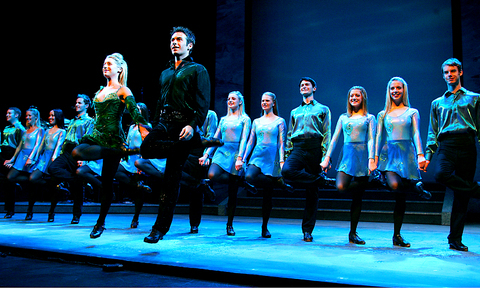Fans of Irish dance are in for a treat in the coming weeks when the "original" Irish dance ensemble, Riverdance makes its Taiwan debut and performs in Taipei, Taichung, Tainan and Kaohsiung.
Not to be confused with Michael Flatley's "other" foot tapping traditional Irish dance combo, the Lord of the Dance, which has paid numerous visits to Taiwan over the past three years, Riverdance was the first all Irish dance troupe to bring the Irish jig to mainstream audiences the world over.
Flatley's group was initially formed to perform at the 1994 Eurovision Song Contest in Dublin, but Riverdance actually proved more popular than many of contest's lackluster musical acts. Within a year the show that was choreographed to be a little more than a six-minute celebration of Irish culture that took to the stage in between acts had morphed into one of the most popular shows of all time.

Since Flatley quit Riverdance in 1995 the group and show have not only spawned numerous copycat acts, but have led to global interest in all things Irish. Riverdance has performed nearly 10,000 concerts, has played to packed houses in over 30 countries, and has netted merchandising sales in excess of US$35 million. And as if all that isn't enough to impress, then audience figures certainly should, as an estimated 2 billion people worldwide have seen the show.
The Riverdance troupe is no longer a single company. There are now three groups all of which take their names from Ireland's rivers. The Boyne tours in North America, the Avoca tours throughout Europe and the Corrib, which is named after the river that runs through the picturesque county of Galway, is tasked with keeping Asian audiences entertained.
While several local newspapers, a well-known singer and a rather un-Broadway savvy politician have recently been critical of touring groups that perform in Taiwan -- labeling the Really Useful Company that is set to bring Andrew Lloyd Webber's Phantom of the Opera to Taiwan early next year as "amateurs" -- Riverdance's Corrib troupe is a highly talented,
professional and handpicked unit.
And while only three of the lead roles are performed by genuine Irish dancers who were born and raised in the Land of the Blarney Stone organizers are not expecting this to hinder ticket sales or local audiences' enjoyment of the show.
What: Riverdance Live in Taiwan
Where and when: Thursday, Dec. 1 until Dec. 8 Taipei International Convention Center (台北國際會議中心); Dec. 10 and 11 Taichung Chunghsing University (台中中興大學); Dec. 12 and 13 Tainan City Cultural Center (台南市立文化中心); Dec. 15 through 17 Kaohsiung Chideh Hall (高雄至德堂).
Tickets: Tickets for Taipei shows cost from NT$800 to NT$4,800 and for performances in Koahsiung, Taichung and Tainan tickets cost from NT$600 to NT$3,600. Tickets for all performances are available from ERA ticketing outlets nationwide.

June 2 to June 8 Taiwan’s woodcutters believe that if they see even one speck of red in their cooked rice, no matter how small, an accident is going to happen. Peng Chin-tian (彭錦田) swears that this has proven to be true at every stop during his decades-long career in the logging industry. Along with mining, timber harvesting was once considered the most dangerous profession in Taiwan. Not only were mishaps common during all stages of processing, it was difficult to transport the injured to get medical treatment. Many died during the arduous journey. Peng recounts some of his accidents in

“Why does Taiwan identity decline?”a group of researchers lead by University of Nevada political scientist Austin Wang (王宏恩) asked in a recent paper. After all, it is not difficult to explain the rise in Taiwanese identity after the early 1990s. But no model predicted its decline during the 2016-2018 period, they say. After testing various alternative explanations, Wang et al argue that the fall-off in Taiwanese identity during that period is related to voter hedging based on the performance of the Democratic Progressive Party (DPP). Since the DPP is perceived as the guardian of Taiwan identity, when it performs well,

The Taiwan People’s Party (TPP) on May 18 held a rally in Taichung to mark the anniversary of President William Lai’s (賴清德) inauguration on May 20. The title of the rally could be loosely translated to “May 18 recall fraudulent goods” (518退貨ㄌㄨㄚˋ!). Unlike in English, where the terms are the same, “recall” (退貨) in this context refers to product recalls due to damaged, defective or fraudulent merchandise, not the political recalls (罷免) currently dominating the headlines. I attended the rally to determine if the impression was correct that the TPP under party Chairman Huang Kuo-Chang (黃國昌) had little of a

At Computex 2025, Nvidia CEO Jensen Huang (黃仁勳) urged the government to subsidize AI. “All schools in Taiwan must integrate AI into their curricula,” he declared. A few months earlier, he said, “If I were a student today, I’d immediately start using tools like ChatGPT, Gemini Pro and Grok to learn, write and accelerate my thinking.” Huang sees the AI-bullet train leaving the station. And as one of its drivers, he’s worried about youth not getting on board — bad for their careers, and bad for his workforce. As a semiconductor supply-chain powerhouse and AI hub wannabe, Taiwan is seeing